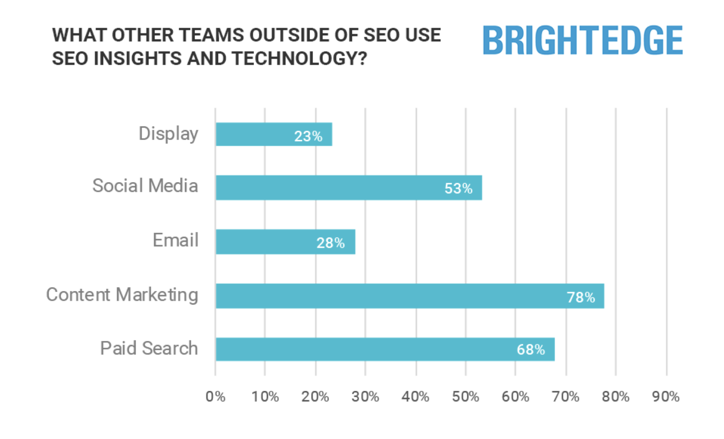
Search is changing to line up with purchasers inclinations. So as to keep ahead, it is basic to utilize SEO information and continuous bits of knowledge as keys to comprehension, streamlining for, and drawing in with shoppers. Web optimization is developing and transforming into a cross-useful rotate work that goes past simply rank and adjusts itself to cross-channel advanced income. Understanding both recorded and continuous information and working over every single advanced capacity is getting to be vital.

Table of Contents
Increase Your Traffic with a Featured Snippet
Based on a recent aHrefs study, you’re getting 31% less traffic by NOT owning the Featured Snippet position, even if you rank #1. Ready to increase traffic by 31+%? Learn how at FeaturedSnippetTool.com.
LEARN MORE→
Consumer interests change in the blink of an eye.
Constant connectedness and AI-powered, intelligently-automated technologies are driving a new standard of service. People now expect that each brand interaction will be easy, personalized, and immediately fruitful.
Consumers crave instant access to real-time information, products, and services – whether it’s “bring me food fast” with Door Dash, or “show me your inventory” on Ikea’s website, or “Alexa, is it going to rain today?”
Marketers are struggling to keep pace – 77% believe real-time personalization is crucial, but 60% of marketers still struggle to personalize content in real-time.
Content and digital marketers are challenged to meet consumers in their decision-making moments with personalized, custom content and offer that answer an immediate need.
Early 2019 research shows that fully 87% of consumers want a personalized and consistent experience across all shopping channels.
At a time when SEO professionals are under elevated pressure to find just the right people, processes and technology to meet and prove their revenue objectives, delivering on customer expectations is requisite.
Challenge: Meet Consumers in Their Decision-Making Moments
As early as 2016, Think with Google reported that:
- 76% of people who conduct a local search on their smartphones visit a business within 24 hours.
- 28% of those searches result in a purchase.
These figures underline the need to know what people are looking for at the moment they are looking for it.
SEO has long been critical to mapping the customer journey and tapping those insights to feed decisions about content, offers, and more.
Competition for those customers is intense and consumer expectations for immediate gratification are only growing more ingrained.
If SEO is going to play more than a long-range role in responding to – let alone shaping – consumer tastes in a meaningful way, a way that satisfies consumer demands and drives revenue growth, it needs to get faster.
SEO will need to go real-time.
The New Marketing Mandate: Efficient, Real-Time, Multi-Channel SEO
Whether it’s in the form of research that establishes purchase intent or research that compares and narrows purchase options, a search is central to the customer journey.
SEO optimization is front and center in the modern-day digital enterprise. It feeds key insights to content marketing, email marketing, social media, paid marketing, and even back to customer service, product development, and operations.
Because it’s moving the needle, there are greater expectations than ever before. SEO is no longer marketing’s side project as it drives insights and revenue across multiple digital channels.
According to research from BrightEdge (disclosure: a client), SEO insights are used by a variety of marketers from content, paid, social, email, and display media.
 The maturation of SEO point solutions into unified, data-integrated SEO platforms has delivered essential operational efficiencies.
The maturation of SEO point solutions into unified, data-integrated SEO platforms has delivered essential operational efficiencies.
Best-in-class platforms are also helping SEO professionals and digital marketers tackle the “V-ing” of search (voice, visual, and vertical).
The immediate new frontier is leveraging these advancements in capability and efficiency to produce and act on in-the-moment SEO insights.
Real-Time Insights
“How can I help you?”
Block fraudulent clicks on your Google Ads.
Automatically protect your ads from competitors, bots, click farms and other forms of click fraud. Simple setup. Start your free trial today.
This simple question is implicit in most facets of modern, SEO-driven commerce, and companies are fighting for the opportunity to answer it.
The answer that best meets the customer’s criteria gets the business in SEO.
For an increasing volume of search queries, the insights that traditional, historical-based SEO insights provide mean the opportunity to even pose the question is often lost before the insights are generated.
This is where real-time insights give SEO and marketing a fighting chance.
More and more search trends are time-limited, which only reflects:
- Our larger world and its local and regional variations.
- Shopping seasons and micro-seasons.
- Shifting geo-political winds.
- Legislative changes.
- Pop culture trends.
- Even small and large daily weather changes.
Days and hours count in the world of search. Consider these examples:
Slam Dunk Opportunity
In July 2018, NBA star LeBron James signed a contract with the Los Angeles Lakers. In the first three hours following the announcement, the largest seller of licensed jerseys reported a 600% spike in sales of his jersey.
Traditional SEO research would have reported the associated spike in search interest for the jersey days or weeks after the fact, long after the buying frenzy had cooled.
Real-time SEO research would have given retail competitors an opportunity to steal market share at the height of demand.
Itching to Buy
Early 2019 brought an outbreak of measles cases to the U.S. Pacific Northwest. Concurrently, the Washington State Department of Health reported a 6x increase in vaccinations compared to the prior year.
With real-time SEO rank data, area pharmacies and pharmacy chains would know their chances of capturing customers seeking vaccines based on their rank position.
They would also be able to apply real-time keyword research to improve or protect their position.
Accounting for Trends
New U.S. tax laws for 2018 brought some unexpected surprises to taxpayers filing their federal income taxes in 2019.
One week before the tax deadline, the Senate Finance Committee said it expected to receive an “unprecedented 14.6 million requests for filing extensions.”
Accounting firm SEO professionals and digital marketers who employ real-time SEO research and insights would be able to track the reality of the finance committee’s prediction during the final stretch to the tax filing deadline.
Real-time keyword research would help them identify localized pockets of demand and be there for filers with content and offers in their decision-making moment.
Conclusion
Search is changing to align with consumers’ preferences. In order to keep ahead, it is essential to use SEO data and real-time insights as keys to understanding, optimizing for, and engaging with consumers.
SEO is evolving and morphing into a cross-functional pivot function that goes beyond just rank and aligns itself to cross-channel digital revenue.
Understanding both historical and real-time data and working across all digital functions is becoming key.
Via: https://www.searchenginejournal.com/real-time-seo/308353/#close



What do you think?